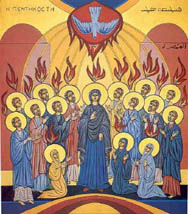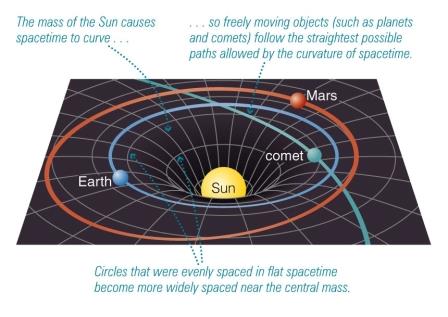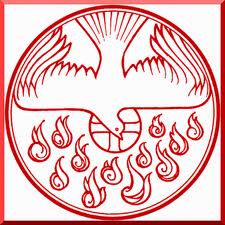Fascinating thoughts regarding Space, Time, Christ, and Whitsun, from a Whitsun lecture given by Steiner at the same time he was giving the Karma lectures:
Indeed, when we follow this Ego in its successive evolutions through lives between birth and death and between death and a new birth, we cannot remain within the world of Space at all. For two successive earthly lives cannot be within the same space. They cannot be within that Universe which is dependent on spatial co-existence. Here therefore we go right out of Space and enter into Time. This is actually so. We go out of Space and come into the pure flow of Time when we contemplate the Ego in its successive lives on Earth. Now consider this, my dear friends. In Space, Time is still present, of course, but within this world of Space we have no means of experiencing Time in itself. We always have to experience Time through Space and spatial processes. For example, if you wish to experience Time, you look at the clock, or, if you will, at the course of the sun. What do you see? You see the various positions of the hands of the clock or of the sun. You see something that is spatial. Through the fact that the positions of the hand or of the sun are changed, through the fact that spatial things are present to you as changing, you gain some idea of Time. But of Time itself there is really nothing in this spatial perception. There are only varied spatial configurations, varied positions of the hands of the clock, varied positions of the sun. You only experience Time itself when you come into the sphere of the soul’s experience. There you do really experience Time, but there you also go out of Space. There, Time is a reality, but within the earthly world of Space, Time is no reality. What, then, must happen to us, if we would go out of the Space in which we live between birth and death and enter into the spacelessness in which we live between death and a new birth? What must we do? The answer is this: We must die! We must take these words in their exact and deep meaning. On Earth we experience Time only through Space — through points in Space, through the positions of spatial things. On Earth we do not experience Time in its reality at all. Once you grasp this, you will say: “Really to enter into Time we must go out of Space, we must put away all things spatial.” You can also express it in other words, for it is really nothing else than — to die. It means, in very deed and truth: to die. When we look up from the Earth to the Sun, we are at the same time looking into the flow of Time. …
Now from this there follows something of great significance. Man only looks up to the Sun in the right way (even if it be but in his mind) when, as he gazes upwards, he forgets Space and considers Time alone. For in truth, the Sun does not only radiate light, it radiates Space itself, and when we are looking into the Sun we are looking out of Space into the world of Time. The Sun is the unique star that it is because when we gaze into the Sun we are looking out of Space. And from that world, outside of Space, Christ came to men. At the time when Christianity was founded by Christ on Earth, man had been all too long restricted to the mere Ex Deo Nascimur, he had become altogether bound up in it, he had become a Space-being pure and simple. … Christ came to bring the element of Time again to men, and when the human heart, the human soul, the human spirit, unite themselves with Christ, then man receives once more the stream of Time that flows from Eternity to Eternity. What else can we human beings do when we die, i.e. when we go out of the world of Space, than hold fast to Him who gives Time back to us again? At the Mystery of Golgotha man had become to so great an extent a being of Space that Time was lost to him. Christ brought Time back again to men.
If, then, in going forth from the world of Space, men would not die in their souls as well as in their bodies, they must die in Christ, We can still be human beings of Space, and say: Ex Deo Nascimur, and we can look to the Child who comes forth from Time into Space, that he may unite Christ with humanity. But since the Mystery of Golgotha we cannot conceive of death, the bound of our earthly life, without this thought: “We must die in Christ.” Otherwise we shall pay for our loss of Time with the loss of Christ Himself, and, banished from Him, remain held spell-bound. We must fill ourselves with the Mystery of Golgotha. In addition to the Ex Deo Nascimur, we must find the In Christo Morimur. We must bring forth the Easter thought in addition to the Christmas thought. Thus the Ex Deo Nascimur lets the Christmas thought appear before our souls, and in the In Christo Morimur the Easter thought. … Let us now imagine first of all the inner mood of a man’s soul to be such that he shuts himself up entirely within this Earth-existence. He can still feel the Divine, for out of the Divine he is born: Ex Deo Nascimur. Then let us imagine him no longer shutting himself up within the mere world of Space, but receiving the Christ who came from the world of Time into the world of Space, who brought Time itself into the earthly Space. If a man does this, then in Death he will overcome Death. Ex Deo Nascimur. In Christo Morimur. But Christ Himself brings the message that when Space is overcome and one has learned to recognise the Sun as the creator of Space, when one feels oneself transplanted through Christ into the Sun, into the living Sun, then the earthly Physical vanishes and only the Etheric and the Astral are there. Now the Etheric comes to life, not as the blue of the sky, but as the lilac-red gleaming radiance of the Cosmos, and forth from the reddish light the stars no longer twinkle down upon us but gently touch us with their loving effluence. …
If a man really enters into all this, he can have the experience of himself, standing here upon the Earth, the Physical put aside, but the Etheric still with him, streaming through and out of him in the lilac-reddish light. No longer now are the stars glimmering points of light; they are radiations of love like the caressing hand of a human being. As we feel all this — the divine within ourselves, the divine cosmic fire flaming forth from within us as the very being of man; ourselves within the Etheric world and experiencing the living expression of the Spirit in the Astral cosmic radiance, there bursts forth within us the inner awakening of the creative radiance of Spirit, which is man’s high calling in the Universe. …
When those to whom Christ revealed these things had let the revelation sink deep into their being, then the moment came when they experienced the working of this mighty concept, in the fiery tongues of Pentecost. At first they felt the falling away, the discarding of the earthly-Physical as death. But then the feeling came; This is not death, but in place of the physical of the Earth, there now dawns upon us the Spirit-Selfhood of the Universe. “Per Spiritum Sanctum Reviviscimus.”
Thus may we regard the threefold nature of the one half of the year. We have the Christmas thought — Ex Deo Nascimur; the Easter thought — In Christo Morimur; and the Whitsun thought — Per Spiritum Sanctum Reviviscimus.
Rudolf Steiner
Read the full lecture here.



Leave a Reply